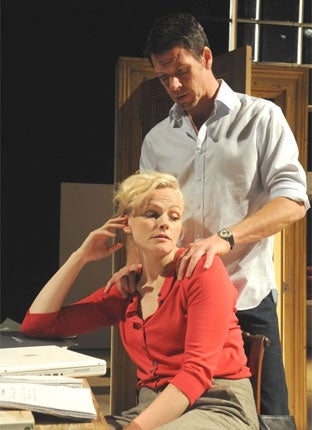David Lister: Comedy doesn't travel... you need to be in the room to get it
The Week in Arts

The apocryphal story has a dying actor surrounded by his friends. "What is it like to die?" they ask. "It's hard," he replies, "but comedy's harder."
Harder still is writing or reading about comedy. At the moment most of the country's best stand-up comics, both new and established, are performing on the Edinburgh Fringe. Always at this time of year I am reminded of the time that I ventured a criticism of some of the female comics on the Fringe, and the comedy critic of Time Out magazine wrote without a hint of irony: "David Lister should expose himself to more female comedians."
I hesitate to provoke such dangerous advice again. But I feel that comedy is the hardest art form to convey to those who weren't present at the event. What is the comedy critic to do? You either give away the jokes and spoil the show for those still to see it, or you write something like: "She did a hilarious routine about a vacuum cleaner with a mind of its own." And that simply doesn't travel.
I'm not even sure that jokes themselves travel. Sat in London for the duration of the festival, the first thing I turn to is the Joke of the Day that The Independent publishes in its round-up of Fringe performances. It gives a good indication of the state of comedy today.
My favourite was the one told by Dan Antopolski: "I've been reading the prequel to 'Hamlet'. It's called 'Piglet'." Good, that. But I found myself wanting to know if it was a throwaway line while talking about something else or part of a run of jokes about Shakespeare or prequels. I crave a context, and you can't get that when you're 400 miles away. I raised a half smile at Roisin Conaty's gag: "I've no sense of direction, which makes it harder to storm off after an argument." Mildly amusing, but it might have been very amusing if it was part of a series of gags about a relationship, and maybe it was. You just don't know if you weren't in the room.
I couldn't raise a smile at all at Ruby Wax's quip: "Haggis? You take the contents of a zoo, put it in a blender and then stuff it in a condom." But... if it was part of a general rant about food, if it was late at night, if you had just come from a restaurant anyway, if you were part drunk, well maybe you would have wet yourself faster than Gerard Depardieu.
With theatre, film, music, you can feel you have witnessed the performance, plot, acting, musicianship from reading or hearing about it. The excitement of a great performance on stage or in the orchestra pit can be conveyed in print and its technique dissected. Analyse a joke and you kill it. Comedy simply doesn't travel. Unfortunately for those of us not in Edinburgh, you just have to be there.
Blair insight needed more pen chewing
The play Loyalty, written by my former Independent colleague Sarah Helm, has just finished its run at the Hampstead Theatre. At present it doesn't look like it will transfer to the West End or beyond, which is a shame, as it is quite extraordinary in its revelations about what happened and what was said in Tony Blair's inner circle, and indeed between Blair and Bush, at the time of the Iraq war. Helm is married to Jonathan Powell, who was Blair's chief of staff, and as the play makes clear, she listened in on sensitive phone calls and was present at high-level dinners.
I attended one of the last performances, and I could see members of the audience thoroughly enjoying the insights into the real Blair and his mannerisms. But I found myself concentrating more on Maxine Peake's portrayal of the Sarah Helm character. It's an odd experience to see a character on stage based on someone you know, and it can distort your critical judgements. Maxine Peake is a fine actress, and I'm sure in her mixture of the need to be on the side of right and a subversive frivolity she reached some emotional truths about the character. But in the whole two hours 20 minutes she didn't chew one single ballpoint pen. That lack of truthfulness in the portrayal may cost her an Olivier award.
And finally ... The Hour bottles it
I return to the matter of anachronisms in the gripping and brilliantly acted BBC drama The Hour one last time, as emails keep coming in on the subject. Though I originally raised the objection that anachronisms in speech, dress and social manners were distracting and surprising in a BBC drama (would a hostess in 1956 have said "I didn't realise you were 'together'"), I also believe some are a matter of opinion rather than fact.
One reader says that the statement at the time of Suez that this was the end of British colonialism may have proved true, but no one knew it then. Sorry, don't agree. There were plenty of far-sighted people around who would have thought that. I do agree with the reader who says that "less is more" came into the national vocabulary well after 1956, but I can't actually prove it, so I'll give the BBC the benefit of the doubt there too.
But I am grateful to reader Donna Poppy, who clearly watches The Hour with a dictionary at her side. She points out that the suspiciously modern phrase "Don't bottle out on me now" spoken by one character was first used in this way in 1979, according to the Oxford English Dictionary. You can't argue with that.
Join our commenting forum
Join thought-provoking conversations, follow other Independent readers and see their replies
Comments